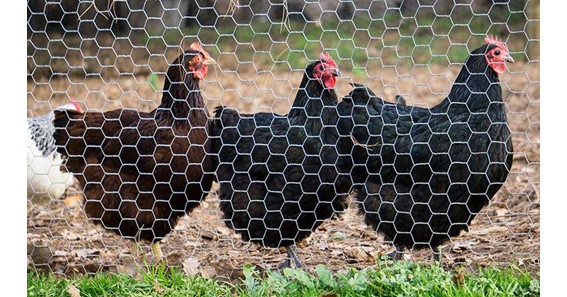When it comes to raising chickens, one of the most important investments you can make is in a high-quality chicken coop. Not only does a good chicken coop provide your birds with a safe and secure place to live, but it can also help protect them from predators and other outside threats.
One of the key components of any chicken coop is the wire that is used to enclose it. Chicken coop wire comes in many different types and sizes, and choosing the right one for your coop can make all the difference in the health and safety of your flock.
In this blog post, we’ll take a closer look at chicken coop wire and some of the key factors you should consider when choosing the right wire for your coop.
Types of Chicken Coop Wire
There are several different types of chicken coop wire to choose from, each with its own unique features and benefits. Here are a few of the most common types of wire used in chicken coops:
- Welded Wire Mesh: Welded wire mesh is a popular choice for chicken coops because it is strong and durable. It is made by welding wires together to create a mesh pattern that is both sturdy and flexible. Welded wire mesh comes in a variety of sizes and gauges, so you can choose the one that best fits your needs.
- Chicken Wire: Chicken wire is a lightweight option that is easy to work with and install. It is made of thin, flexible wires that are woven together in a hexagonal pattern. While chicken wire is not as strong as welded wire mesh, it is still a good option for smaller chicken coops or for areas where you need a more flexible material.
- Hardware Cloth: Hardware cloth is a heavy-duty wire mesh that is made from thicker wires than chicken wire or welded wire mesh. It is typically more expensive than other types of chicken coop wire, but it is also more durable and long-lasting. Hardware cloth is a good option for larger chicken coops or for areas where you need extra protection against predators.
Click here – What Is Fractional Ownership And How To Recover Lost Money?
Factors to Consider When Choosing Chicken Coop Wire
Now that you know a little bit more about the different types of chicken coop wire available, let’s take a closer look at some of the key factors you should consider when choosing the right wire for your coop.
- Predator Protection: One of the most important factors to consider when choosing chicken coop wire is predator protection. Your wire should be strong and sturdy enough to keep out predators like raccoons, foxes, and coyotes. Hardware cloth is often the best choice for this purpose, as it is thicker and more difficult for predators to break through.
- Size of Your Flock: Another important factor to consider when choosing chicken coop wire is the size of your flock. If you have a larger flock, you will need a larger coop and stronger wire to enclose it. Welded wire mesh is a good option for larger coops, as it is strong enough to support the weight of multiple birds.
- Climate and Weather Conditions: The climate and weather conditions in your area can also play a role in the type of chicken coop wire you choose. If you live in an area with heavy rainfall or snow, you may want to choose a wire that is rust-resistant and able to withstand moisture. Stainless steel or galvanized wire are good options for areas with wet or humid conditions.
- Ease of Installation: Finally, you should consider the ease of installation when choosing chicken coop wire. Chicken wire is often the easiest to work with and install, but welded wire mesh and hardware cloth can also be installed with a little effort and the right tools. Consider the time and effort it will take to install your wire when making your decision.
Click here – What Is Storification?
Tips for Maintaining Your Chicken Coop Wire
Once you have chosen the right wire for your chicken coop, it’s important to properly maintain it to ensure it lasts as long as possible. Here are a few tips for maintaining your chicken coop wire:
- Regularly inspect your wire for damage or wear and tear. Replace any damaged sections as soon as possible to prevent predators from getting in.
- Keep your wire clean and free from debris. Dirt and debris can accumulate on your wire, which can make it more difficult to see if there are any holes or weak spots.
- Consider adding additional reinforcement to areas that are prone to damage. For example, you can add extra wire mesh around the bottom of your coop to prevent predators from digging underneath.
- Consider adding a layer of chicken wire or hardware cloth to the inside of your coop as an added layer of protection.
In conclusion, choosing the right chicken coop wire is an important decision that can have a big impact on the safety and health of your flock. By considering factors like predator protection, the size of your flock, climate and weather conditions, and ease of installation, you can make an informed decision and choose a wire that will provide the best possible protection for your birds. With proper maintenance and care, your chicken coop wire can last for many years and help keep your flock safe and secure.
At Critterfence.com, we offer a variety of high-quality chicken coop wire options to meet the unique needs of chicken owners. From welded wire mesh to hardware cloth, we have the products you need to keep your flock safe and secure. Contact us today to learn more about our chicken coop wire products and how they can benefit your birds.

